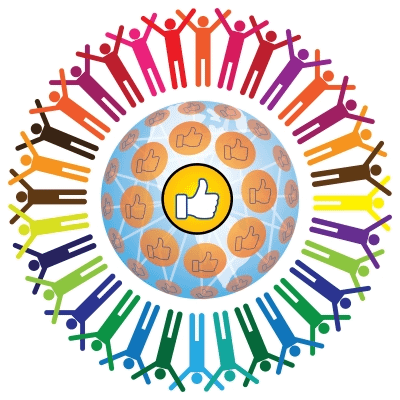
Over the past couple of years, SEO’s and marketers have been theorizing and testing the idea that social signals are taken into account by Google as a ranking factor. Much has been written on the subject, however most experts have agreed that these signals – even if they weren’t currently being used – were likely to be a significant ranking factor in the future.
In fact, in 2010, Danny Sullivan, founding editor of Search Engine Land, wrote, “Retweets serve as a new form of link building. Get your page mentioned in tweets by authoritative people, and that can help your ranking in regular search results, to a degree.”
SEO’s and marketing experts have been conducting their own research into social signals, with many reporting that likes and tweets have had an impact on search rankings. In the 2013 SEO Rankings Factors – Ranking Correlation Study done by Search Metrics, social signals even took up 7 of the 10 top spots for correlated ranking factors (factors that appeared to have an impact on search rankings).
These 7 included (in order of correlation):
- Google +1’s
- Facebook shares
- Facebook total
- Facebook comments
- Facebook likes
- Tweets
The problem, however, has been that finding a cause and effect relationship between social signals and increased rankings has always been difficult, if not impossible.
Here’s why: Let’s say a particular piece of content is shared on Facebook, and receives hundreds or even thousands of likes. A week later, this piece of content is now ranking highly in the search engines, whereas before it was shared on Facebook, it wasn’t. Does this necessarily point to the impact of social signals on search rankings?
According to Matt Cutts, the answer is no. In a January Google Webmaster video, Cutts answers the question: “Are Facebook and Twitter signals part of the ranking algorithm? How much do they matter?”.
His answer: “As far as doing special, specific work to sort of say, ‘Oh, you have this many followers on Twitter or this many likes on Facebook’, to the best of my knowledge, we don’t currently have any signals like that in our web search ranking algorithms.”
He goes on to give two reason why social signals on Facebook and Twitter aren’t, and likely never will be, significant ranking factors: First, because these sites may restrict access to Google’s bots at any point in time, it’s not worth the time and energy to engineer these signals into their algorithms; and second, because personal or sensitive information shared on these platforms can change at any time, and Google doesn’t want to return outdated information.
This is big news for marketers, as it lays to rest the idea that tweets, likes and shares have a direct impact on search rankings. So, does this mean social media is no longer important for SEO or as a part of your bigger digital marketing strategy?
Let’s take a look.
Is Social Media Still Important for SEO in 2014?
If social signals aren’t, and potentially never will be, part of Google’s ranking algorithm, is social media still a necessarily component of your SEO or marketing strategy?
Well, we know there are certainly other benefits to using social media for business, even if we take SEO out of the equation. For instance, according to the 2014 Social Media Marketing Industry Report from Social Media Examiner, a whopping 92% of marketers still believe social media is important for their business.
The study also found that other reported benefits of using social media for business are increased exposure (92%), increased traffic (80%), developing loyal fans (72%), providing marketplace insight (71%) and generating leads (66%).
It’s also interesting to note that 61% of respondents reported improved search rankings from their social media efforts. But how is this possible, if social signals aren’t a ranking factor?
It all comes down to links.
In the video, Cutts points out why search rankings appear to improve with increased social signals: “There was an SEO that said, ‘OK, we see a lot of links on Facebook, and those are the pages that rank well’; but that’s correlation, not causation. Instead, it’s probably that there’s something really awesome, and because there’s something awesome, then it gets a lot of likes on Facebook, and a lot of people decide to link to it” [emphasis mine].
When you produce excellent content, the natural results are likely to include both increased social sharing and increased links. This works in two ways:
1. Awesome content tends to gets links simply because it’s awesome. Your website visitors appreciate your content, and decide to link to it on their website or blog.
2. Social media propels this process by getting your awesome content in front of more people. The more people who see and appreciate your content, the more opportunities you have to accumulate links.
So, awesome content will always accumulate links, with or without the use of social media. Social media, however, can speed up this process exponentially through the rapid, real-time sharing of your content.
As your content begins to accumulate more and more links, Google begins to recognize that this piece of content is relevant and authoritative. This, in turn, means improved authority for your content (and potentially your site as a whole), and improved search rankings overall.
What About Google + and SEO?
We’re still unclear as to the exact role of Google+ when it comes to search rankings. In the video discussed above, Cutts doesn’t mention whether social signals on the Google+ platform are ranking factors; although certainly Google+ would face the problem of indexing personal information, which was one of the roadblocks he mentions to factoring social signals into their algorithm.
Many experts strongly suspect, however, that if Google were going to incorporate social signals, they would pilot it on their own platform. With no risk of being banned or limited in their access to the platform, it would be the ideal social network on which to test out algorithms changes.
We’re already seeing the importance of having Google Authorship set up, and according to Cutts, over the next number of years, we’re likely to move towards a more efficient recognition of identity when it comes to content. He says, “Over 10 years, we’re more likely to understand identity, and to understand the social connection between people.”
My guess is that one of the ways they’ll be able to do this is through Google Authorship and Author Rank. Find out more about this in my recent post What You Need to Know About SEO in 2014.
Conclusion
It’s clear that there are many benefits to using social media for your business, even if social signals are never a significant ranking factor. Sharing and promoting your content on social media is still one of the best ways to extend your reach, build your brand and to entice qualified visitors to your site.
Now that we have a better of idea of how Google uses (or doesn’t use) social media likes, shares and tweets, we can get on with the business of creating great content that naturally accumulate links, and that helps to build our influence online.
Have you been relying on social signals as part of your online marketing strategy? Will your strategy change at all in light of this news?
Image attribution; Links By Clips courtesy of Ramberg Media under CC 2.0


